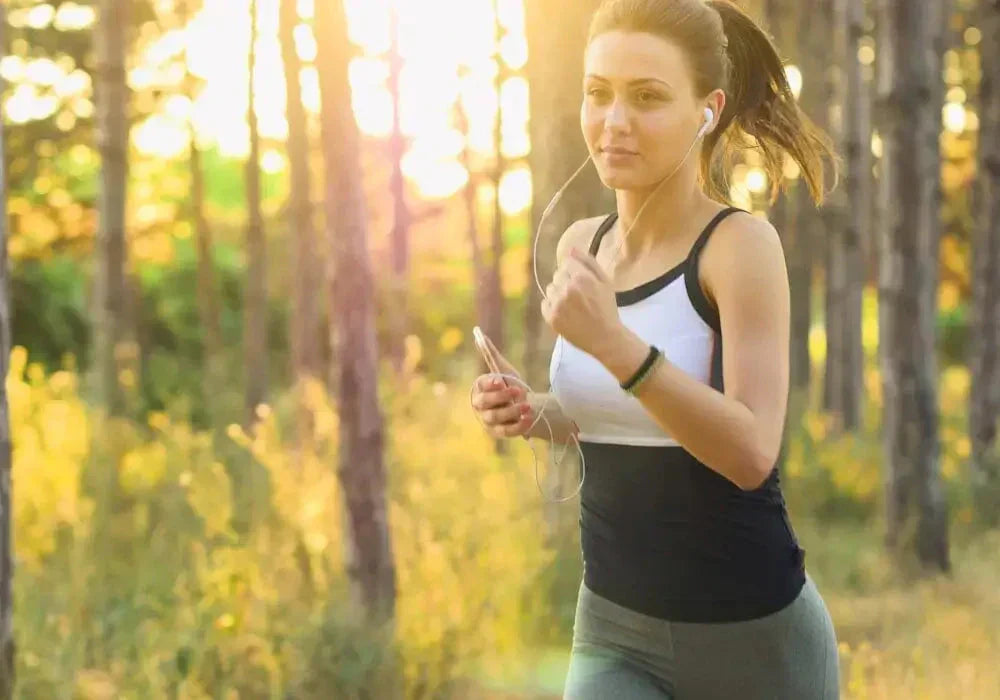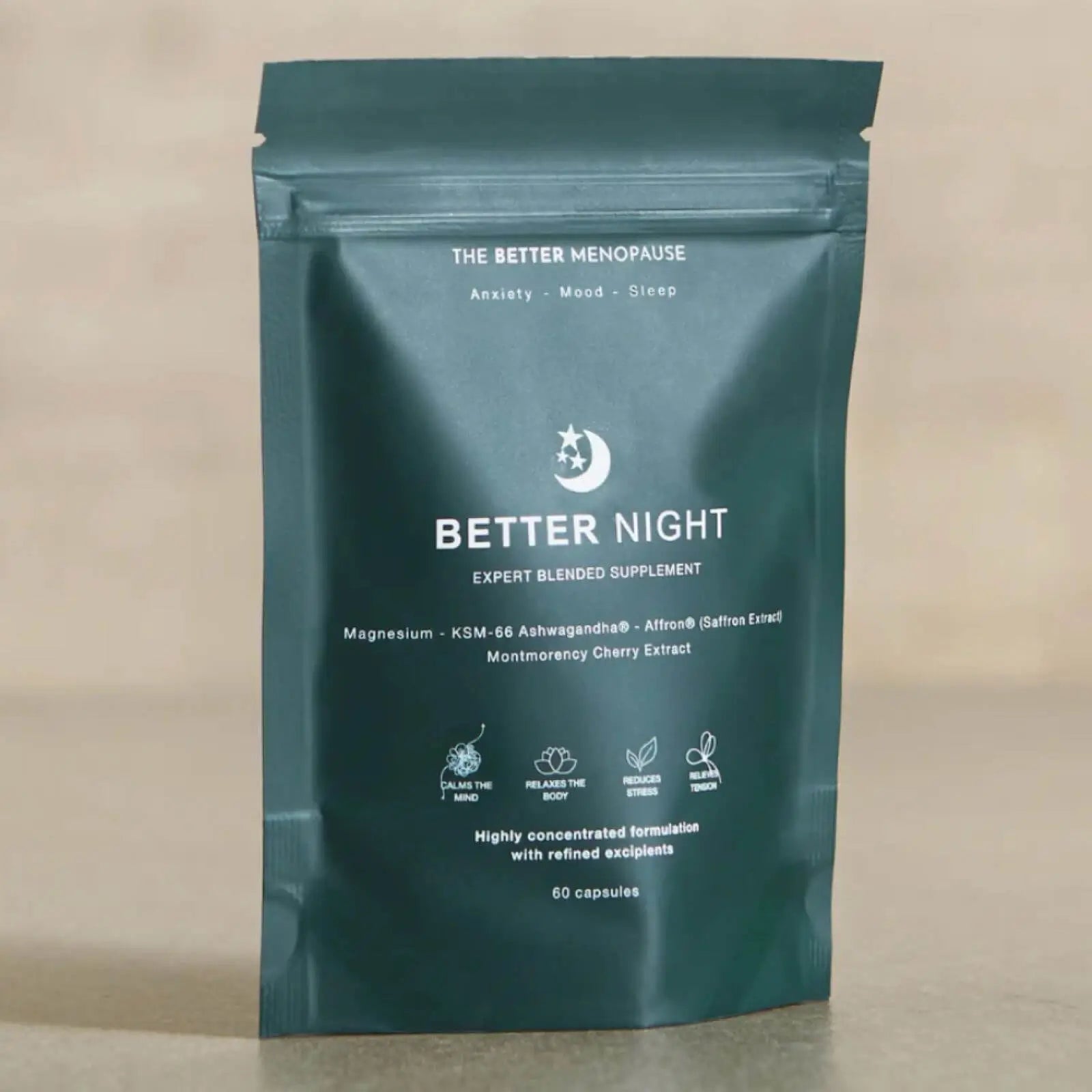
Menopause hip pain: oestrogen, exercise and gluteal tendinopathy
Exploring the connection between low oestrogen, exercise and hip pain during perimenopause and menopause. Plus, why it’s worse at night and what you can do about it.
If you’re experiencing hip pain during perimenopause or after menopause, there could be a connection. Reduced oestrogen levels can increase your risk of developing a condition called gluteal tendinopathy. They may also contribute to osteoarthritis, which can affect joints including your hips.
While certain types of exercise can help, too much, or the wrong kind, could make things worse. Something as simple as the way you sit or stand could also contribute to hip pain. Depending on the cause, your hip pain may be particularly bad at night, and changing your sleeping position could improve things.
Pain medications can help in some cases, but you may need a prescription. Research also suggests that collagen supplements can improve tendinopathy.
For relief from a range of perimenopause and menopause symptoms, try The Better Gut probiotic supplements.
And for regular expert tips on menopause health and nutrition – plus 10% off your first order – join our newsletter.
Menopause hip pain and gluteal tendinopathy
The main cause of menopause-related hip pain is a condition called gluteal tendinopathy. As with many symptoms of perimenopause and menopause, it’s more common at this time because of changes in hormone levels.
Gluteal tendinopathy is the result of strain on the tendons that connect your gluteal muscles – your buttocks – to a point at the top of your femur, the upper leg bone.
The point on your femur where the tendons attach is the widest part of your hip. It’s called the greater trochanter, which is why you may sometimes hear gluteal tendinopathy called greater trochanteric pain syndrome (GTPS) or trochanteric bursitis.
Gluteal tendinopathy can be caused by overuse of your tendons: for example, doing a lot of exercise without giving yourself enough recovery time, or the increasing strain of gradually putting on weight. But it can also be due to underuse: not moving enough so that the tendons begin to deteriorate and weaken.
Gluteal tendinopathy can also be caused or made worse by falling directly onto your hip or by body postures that compress the tendons, such as standing with more of your weight on one leg or sitting with your legs crossed.
The tendons in your hips are in a constant cycle of being put under strain and repaired. If they wear out at a faster rate than they can be repaired, they will start to weaken and become painful.
Gluteal tendinopathy hip pain symptoms
The main symptom of gluteal tendinopathy is pain on the outside of your hip or upper leg. However, it can extend into other areas, including:
- down the side of your thigh, as far as your knee
- groin
- lower back
- buttock
The pain may also flare up in certain situations and postures, such as:
- lying on the affected side
- walking uphill or up stairs
- standing on one leg
- after a long period of rest
- stiffness for your first few steps after standing up
- activities where you squat
- after impact exercise, like running and jumping
Why is gluteal tendinopathy more common in menopause?
Women’s risk of developing gluteal tendinopathy increases as they get older, with 1 in 4 women over 50 experiencing it. Although this may be partly to do with the increased wear and tear that comes with age, it’s also significantly influenced by hormone changes.
As you enter perimenopause – the transitional years before menopause – your levels of reproductive hormones like oestrogen fluctuate then gradually decrease as you head towards menopause.
Oestrogen plays an important role in the production of collagen, which is the main constituent of your tendons, including those in your hips. Less oestrogen means it’s harder for your body to replace the collagen in your tendons and repair the wear and tear.
Studies have shown that lower levels of oestrogen are linked to reduced collagen production, weaker, thinner tendons and faster deterioration of tendon tissue.
So at a time when your tendons may already be under strain, menopause can make this worse.
How to treat hip pain from gluteal tendinopathy
If you’re diagnosed with gluteal tendinopathy, you may be referred to a physiotherapist. They will give you advice on how to manage and improve the condition, including specific exercises to follow.
They may recommend some of the following dos and don’ts:
- Exercises to strengthen your hip: A specially designed programme of gentle exercise will strengthen the muscles around your hip and gradually add to the load on your tendons. According to the NHS, it can take 6–12 months for exercise to get rid of the symptoms of gluteal tendinopathy.
- Stay active but listen to your pain: Complete rest won’t cure gluteal tendinopathy so you should stay active. Too much exercise will make it worse, though. The NHS says ‘mild discomfort that eases after exercise’ is fine but regular ‘moderate to severe pain’ could mean you’re overdoing it. Short, flat walks can be a good solution.
- Massage, but only in the right areas: Massaging your buttocks could help to relieve your hip pain – but avoid massaging the painful area on your hip itself as this will put more pressure on the tendons and could make things worse.
- Avoid too much stretching: Although it may feel as if you need to stretch out a painful hip, this is another way to compress the tendons, which could cause more pain if you do it regularly.
- Eat a healthy diet: Carrying too much body weight can make your symptoms worse by putting extra pressure on the tendons that connect to your hip. The right diet could help you lose weight in a sustainable way and improve the health of your tendons. Talk to your doctor about the best diet for you.
- Try collagen supplements: Studies suggest that supplements containing collagen-derived peptides, such as gelatine and hydrolysed collagen, can help with tendinopathy. Your tendons are mostly made of type I collagen, while the cartilage in your joints contains type II.
- Limit certain postures and movements: As well as avoiding activities that you find too painful, it’s important to be aware of certain body positions and movements that could make your symptoms worse.
Postures and movements to limit where possible include:
- leaning on one leg, or ‘hanging’ on your hip
- sitting with your legs crossed
- using the stairs without a handrail
- sitting on low chairs
In the section below we’ll look at positions to avoid, and those to try, if you get hip pain while in bed or lying down.
Menopause hip pain at night and what to do
Many symptoms of perimenopause and menopause can be worse at night – think hot flashes/ night sweats and anxiety, to name just two.
Hip pain from gluteal tendinopathy is another of these, and the main reason is likely to be your sleeping position.
Lying on the side where you have hip pain can increase discomfort by compressing your tendons. But so can lying on the opposite side with your painful leg laid in front of your bottom leg.
If you’re able to sleep on your back, then lying with a pillow under your knees may help to reduce your hip pain.
Otherwise, try lying on your good side with a pillow between your legs to keep them in line with your hips.
Osteoarthritis and menopause hip pain
Reduced oestrogen doesn’t just affect your tendons, it can also impact the health of your cartilage – the material that acts as a cushion between the bones in your joints.
If you’ve been through menopause, you have a higher risk of developing osteoarthritis, where the cartilage starts to break down. This can cause pain, stiffness and swelling, including in your hips.
Treatments for osteoarthritis
There are a number of treatments that can help with osteoarthritis pain. However, because it’s such a delicate condition, most of them require talking to your doctor first.
- Exercise: Given the pain and stiffness that comes with osteoarthritis, you might think exercise would make it worse. In fact, regular physical activity that increases your range of movement and strengthens the muscles that support your joints is one of the most effective ways to ease symptoms. Talk to your doctor or a physiotherapist to find an exercise plan that’s right for you.
- Weight loss: Being overweight can make hip pain from osteoarthritis worse by placing more pressure on your joints. This online NHS tool can tell you if you may need to lose weight. If so, exercise can help, along with improving your diet. Your doctor or another health care professional can explain how to lose weight in a gradual and healthy way.
- Pain relief medicines: Medications prescribed for osteoarthritis pain include paracetamol, non-steroidal anti-inflammatory drugs (NSAIDs) like ibuprofen, opioids such as codeine and sometimes steroid injections. Although some of these are available over the counter, you should talk to your doctor first as they can have side effects and you may need to take other drugs at the same time.
- Hot and cold packs: Holding a hot water bottle filled with either hot or cold water against your hip may help with the pain. You can also buy special packs to heat up in the microwave or cool in the freezer.
Does HRT help with hip pain?
Hormone replacement therapy (HRT) uses tablets, skin patches or gels to replace reproductive hormones including oestrogen that are lost during menopause.
Given the links between oestrogen levels and joint health, HRT seems like it could be a good way to treat the underlying problems and therefore the pain.
However, while some studies have shown minor improvements in joint pain for women who used HRT, overall results have been inconsistent and more research is needed.
For now, talking to your doctor is probably the best way of deciding whether HRT is right for you.
Summary
Reduced oestrogen levels during menopause can lead to hip pain by impacting how your body renews the collagen in your tendons and the cartilage in your joints. This increases your risk of gluteal tendinopathy or osteoarthritis.
Gluteal tendinopathy can be the result of too much exercise, and not giving your hip tendons enough time to recover, or not getting enough physical activity. The way you sit or stand can also make it worse.
Depending on the cause of your hip pain, a physiotherapist can give you advice on the right kinds of exercises to do and what to limit. If your hip pain is worse at night, changing your sleeping position may help.
For short-term pain relief, try hot or cold packs for osteoarthritis, and massaging your buttocks for gluteal tendinopathy.
Collagen supplements may also improve tendinopathy.
For help with a range of perimenopause and menopause symptoms, try The Better Gut probiotic supplements. Probiotics can help to reduce inflammation which aids pain management. The six strains of friendly bacteria in The Better Gut have been specially chosen to improve:
- bone density and the risk of osteoporosis
- inflammation and the immune system
- hot flashes and night sweats
- mood and symptoms of anxiety and depression
- brain fog and mental fatigue
- sleep quality
- bloating and constipation
- vaginal health
- maintaining a healthy weight
Get 15% off your first order of The Better Gut with the discount code WELCOME15.
Related Product
-
Regular priceFrom £59.00Regular priceSale priceFrom £59.00 Save £-59.00 (%)Unit price/ per
Better Gut
in your cart




